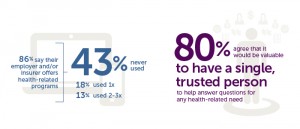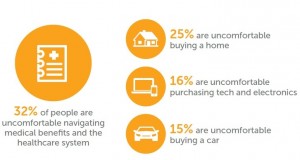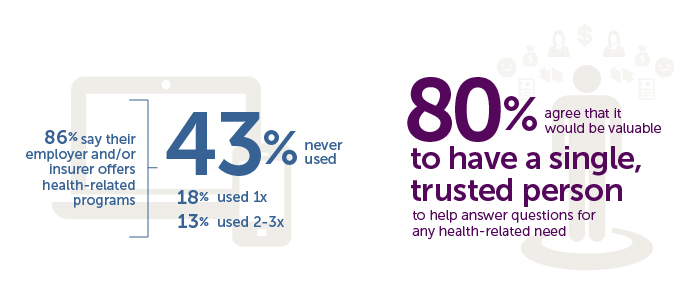
8 in 10 Americans would like one trusted person to help them figure out their health care, according to the Accolade Consumer Healthcare Experience Index Poll, conducted by The Harris Poll. The study gauged how Americans feel about their healthcare, especially focusing on employer-sponsored health insurance.
One-third of people (32%) aren’t comfortable with navigating medical benefits and the healthcare system; a roughly percentage of people aren’t comfortable with their personal knowledge to make  financial investments, either (35%). Buying a car, a home, technology and electronics? Consumers are much more comfortable shopping for these things.
financial investments, either (35%). Buying a car, a home, technology and electronics? Consumers are much more comfortable shopping for these things.
Consumers say that the most onerous aspects of managing personal health care are coordinating all of the different aspects of benefits (55%), understanding what the care will cost them (53%), and selecting and understanding their health benefits (50%). A plurality of consumers are also concerned about making sure their claims and bills are paid correctly (45%).
For employers, employees’ healthcare hassles spill over into the workplace and productivity: 9 in 10 consumers say they deal with health benefits and health-related issues while at work, spending 3.5 hours each month dealing with healthcare issues. Due to dealing with health issues or benefits, 28% say they’re distracted, anxious, or stress-filled, and 22% say they’ve missed work as a result of dealing with health issues or benefits.
The Harris Poll surveyed 2,046 adults 18 and over in September 2015, among whom 1,536 had health insurance through their employer, private insurance, or Medicare.
Health Populi’s Hot Points: What consumers say they don’t need is more programs to help them manage health like wellness tools and digital/mobile apps; they’re looking for support to help them manage what’s already offered, and to navigate the labyrinthine, fragmented, complex healthcare system.
Thus, the 80% of consumers say they would value a single, trusted source to help them with their healthcare needs. Call this a healthcare concierge, sherpa, coach.
That individual is not the doctor (today). 70% of consumers in this study see their doctor as their go-to trusted health care resource. However, only 16% of people told Accolade that their physician takes time to better understand their personal and life situation, not just their medical issue, during their visit. But the vast majority of consumer-patients would value their physicians being more engaged in holistically discussing their lives.
The detail in those lives — the social determinants of health, like job and food security, healthy social relationships, moderate drinking, and safe homes and neighborhoods — are the stuff that can prevent people from filling prescriptions and taking medicines, staying resilient when battling cancer, and managing lifestyle-related conditions like diabetes and gut conditions. Meaningful conversations between clinicians and care providers with patients can help bolster clinical outcomes. When the clinician or provider doesn’t have time for such meaningful interactions, new health system entrants such a digitally-enabled care concierges and avatars for conversations are beginning to connect these dots.





 Thank you FeedSpot for
Thank you FeedSpot for